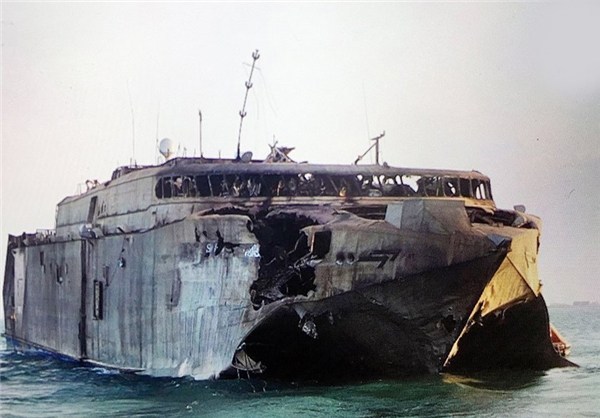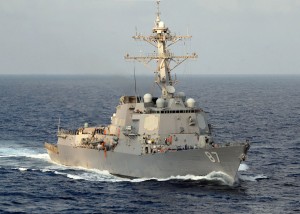October 14, 2016

Two missiles fired at a US Navy warship off Yemen may have been Iranian-made, which raises the issue of whether Iran has committed an act of war against the United States.
Neither missile came anywhere near the USS Mason, which suggests US Navy defenses are adequate to stop Iran’s missiles.
One day before the attack on the Mason, Houthi rebels in Yemen fired a missile at an unarmed catamaran operated by the UAE, doing massive damage to the vessel. Iranian news media reported the Houthis had sunk the ship, but it was later towed to port and many pictures taken showing the damage and disproving the Iranian claim. The Houthis released a video of the missile being fired and hitting the UAE ship and spoke proudly of the accomplishment.
Then on Sunday, two missiles were fired from Yemen at the USS Mason, a guided missile destroyer with a crew of 380, about one hour apart. Pentagon spokesman Captain Jeff Davis said, “The missiles were fired at the USS Mason from Houthi-controlled territory” and the Mason used its onboard defensive measures to deflect the missiles, which crashed harmlessly in the sea.
Davis did not say whether Iran provided the missiles. He said nothing about the origin of the missiles.
He also did not say how far the missiles impacted from the Mason or what defensive mechanism the Mason used.

A spokesman for the US Central Command, Lt. Ian McConnaughey, later contradicted Captain Davis, saying it wasn’t clear yet whether the Mason was specifically targeted by the missiles. McConnaughey didn’t say if there were other ships in the area.
It appeared the US Navy wanted to be certain of its evidence before blaming Iran for supplying the missiles fired at the Mason. It is presumably looking at sea for pieces of the missiles.
The Houthis denied firing missiles at the Mason. Houthi media insisted the Americans had made up the story in an effort to distract attention from the earlier Saudi air strike on a funeral in Sanaa.
The United States has accused Iran of supplying many kinds of weapons to the Houthis and several months ago intercepted a ship it said was carrying Iranian weapons to the Houthis. Iran has denied ever supplying any weapons to the Houthis.
A vessel that comes under surprise attack in peacetime is usually hit because crews are not looking for an attack and are not prepared. The fact that no damage was done to the Mason could mean the sailors on the ship were very well-prepared and its defensive equipment very capable. On the other hand, it is possible that the missiles fired from Yemen were defective or the crew handling them ill-trained. But the damage done to the UAE catamaran shows the Houthis have capable missiles and a capable launch crew.
The US Navy has not asserted that the Mason’s countermeasures were the reason the missiles missed the ship.
In fact, the Navy has actually said little more than that two missiles were fired from a Houthi-controlled area in the general direction of the Mason.
The UAE and American ships were attacked in roughly the same area—in the Red Sea just north of the Bab el-Mandeb, the strait that links the Red Sea to the Gulf of Aden.
Assuming that Iran supplied the missiles, the next question is whether Iran had any role in operating and launching them. Missiles are complicated and require skilled care to maintain them as well as launch them, so there is speculation that Iranian crews handled the weapons.
If true, that would involve Iran in what would unquestionably be an act of war against the United States.
So far, the missile firings have not become a major issue in the United States and the administration is not being pushed by the public to respond. (The missiles were fired several hours before Sunday night’s presidential campaign debate, which overshadowed news of the missile firings.)
Public awareness could change if the US Navy determines that the two missiles fired at the Mason were of Iranian origin. And it would almost certainly change if there were evidence the launch crew was Iranian.
The Houthis have received a lot of missiles that are assumed to come from Iran. They are mostly short range missiles fired at Saudi military bases. Iranian media regularly report the use of missiles by the Houthis, but do not describe the type of missiles used.
